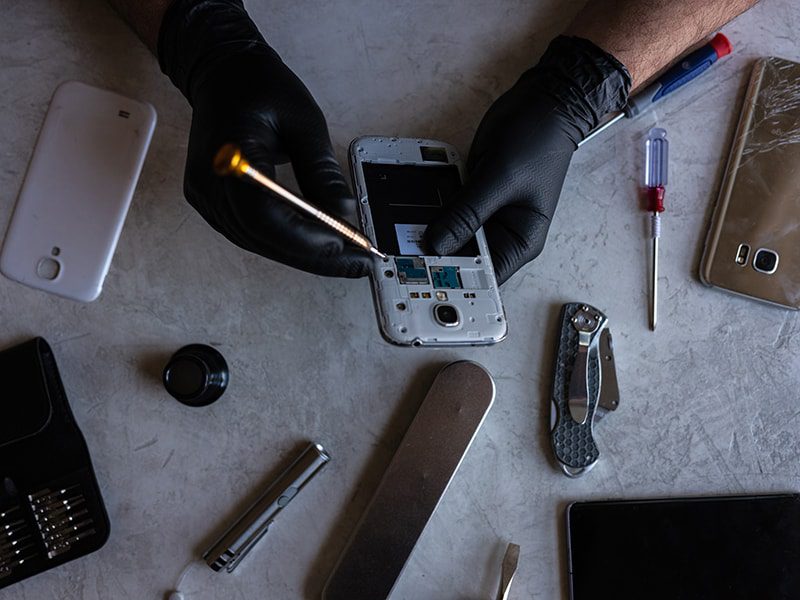Octo Digital Forensics
Digital Forensics Experts & Private Investigations

Data Recovery & Extractions
Digital & Private Investigations
Data Preservation & Expert Witness
Cyber Security & Hack Prevention
How Our Services Works
What's Included
During the discovery phone call, we will engage in a conversation to gather relevant information and gain a comprehensive understanding of the details surrounding your case. This call serves as an opportunity for you to provide us with essential background information, outline your objectives, and discuss any specific requirements or expectations you may have.
How it Works
We value open communication and believe a thorough understanding of your case is crucial. The call establishes clear communication, addresses initial questions or concerns, and ensures alignment with your needs.
ALWAYS CONFIDENTIAL
Rest assured, all shared information is treated with the utmost confidentiality and used solely for evaluating your case and providing requested services.

Life Long Partner
We are committed to building a strong client relationship and providing the highest level of service. The discovery call is an essential first step, enabling us to lay the foundation for successful collaboration and effectively meet your legal needs.
3 Steps To Get Started

Choose A Product

Make A Payment

Fill Out Form With Details
Digital & Private Investigation Services in San Diego
Octo Digital Forensics provided hundreds of clients across the country with timely, cost-efficient, and results-driven investigations in our home town San Diego California. We are a vendor with the county of San Diego and expert witness approved. Our main goal is to ensure the results we deliver are aligned with our client’s exact requirements.
Frequently Asked questions
Cant SEE DONT TOUCH
Private Investigator Near Me
What can digital forensics examiners do?
Digital forensics examiners are professionals who specialize in collecting, analyzing, and preserving digital evidence for investigative and legal purposes. Their primary role involves investigating electronic devices, such as computers, smartphones, servers, and networks, to uncover and interpret digital artifacts.
Here are some key tasks performed by digital forensics examiners:
-
Evidence Collection: They use specialized tools and techniques to collect digital evidence from various devices and storage media. This can include extracting files, recovering deleted data, and capturing network traffic.
-
Data Analysis: Digital forensics examiners analyze the collected evidence to identify relevant information, patterns, and connections. They employ forensic software and techniques to examine file systems, metadata, communication logs, and other digital artifacts.
-
Data Recovery: They employ methods to recover data from damaged or encrypted devices. This may involve repairing corrupted files, bypassing encryption, or reconstructing deleted information.
-
Forensic Reporting: Digital forensics examiners generate detailed reports that document their findings, analysis, and methodology. These reports are often presented as evidence in legal proceedings and must adhere to proper documentation standards.
-
Expert Testimony: In legal cases, digital forensics examiners may provide expert testimony, explaining their findings and their significance to judges, juries, or other legal professionals.
-
Cybercrime Investigation: They play a crucial role in investigating cybercrimes, such as hacking, data breaches, intellectual property theft, and online fraud. They trace digital footprints, identify perpetrators, and help build a case against cybercriminals.
-
Incident Response: Digital forensics examiners assist organizations in responding to cybersecurity incidents. They analyze compromised systems, identify vulnerabilities, and provide guidance on mitigating future risks.
Overall, digital forensics examiners employ their expertise in technology, computer systems, and data analysis to uncover digital evidence, provide investigative support, and contribute to legal proceedings related to digital crimes or disputes.
What can private investigators do?
Private investigators, also known as private detectives, are professionals hired by individuals, businesses, or organizations to conduct investigations and gather information. Their scope of work can vary depending on the specific needs of their clients. Here are some common tasks and services that private investigators can perform:
-
Surveillance: Private investigators conduct surveillance to monitor the activities and behavior of individuals. This can involve tracking their movements, documenting interactions, and capturing photographic or video evidence.
-
Background Checks: They conduct comprehensive background checks on individuals or organizations, collecting information such as employment history, criminal records, financial records, and personal reputation. These checks are often done for pre-employment screening, due diligence in business transactions, or personal safety concerns.
-
Locating People: Private investigators can help locate missing persons, lost relatives, witnesses, or individuals involved in legal matters. They use various resources and techniques to gather information and trace their whereabouts.
-
Asset Searches: They perform asset searches to identify and locate a person’s assets, such as properties, vehicles, bank accounts, and other financial holdings. This can be useful in legal proceedings, debt collection, or divorce cases.
-
Infidelity Investigations: Private investigators are often hired to investigate suspicions of infidelity in relationships. They gather evidence of a spouse’s or partner’s activities, behaviors, and potential involvement with other individuals.
-
Fraud Investigations: Private investigators specialize in investigating fraudulent activities, including insurance fraud, corporate fraud, financial fraud, and identity theft. They gather evidence, interview witnesses, and help uncover the truth behind fraudulent acts.
-
Intellectual Property Protection: They assist businesses in protecting their intellectual property rights by investigating cases of copyright infringement, trademark violations, and trade secret theft.
-
Personal Protection: Private investigators may provide personal protection services for individuals who require additional security measures due to threats, stalking, or other safety concerns.
-
Legal Support: Private investigators work closely with attorneys, providing them with crucial information, conducting witness interviews, and gathering evidence to support legal cases.
It is important to note that the specific services and activities performed by private investigators may vary depending on legal regulations and licensing requirements in their jurisdiction. Private investigators are typically skilled in conducting research, surveillance, interviewing techniques, and evidence collection to provide their clients with accurate and reliable information.
What is Data Recovery?
Data recovery refers to the process of retrieving lost, corrupted, or inaccessible data from various storage devices, such as hard drives, solid-state drives (SSDs), USB drives, memory cards, and more. It involves recovering files, documents, photos, videos, or any other digital information that has been accidentally deleted, damaged, or lost due to hardware failure, software issues, human error, or other factors.
Data recovery techniques and methods aim to retrieve the data from the storage medium and make it accessible again. This process typically involves the following steps:
-
Evaluation: The data recovery process begins with an assessment of the storage device to determine the extent of the data loss, the cause of the problem, and the feasibility of recovery.
-
Device Imaging: If the storage device is physically damaged, a bit-by-bit copy or image of the device is created to prevent further data loss and to work with the replica rather than the original device.
-
Data Extraction: Specialized software and techniques are employed to extract the lost or inaccessible data from the storage medium. This may involve repairing file systems, rebuilding damaged files, or bypassing encryption if necessary.
-
Data Reconstruction: Recovered data fragments are organized and reconstructed to restore the original files and folder structures as much as possible.
-
Verification and Integrity Check: The recovered data is verified for its integrity and accuracy to ensure that it is usable and free from errors.
-
Data Delivery: The recovered data is then delivered to the client through appropriate means, such as transferring it to a new storage device or providing access to the restored files.
It is important to note that successful data recovery depends on various factors, including the cause and extent of data loss, the condition of the storage device, and the expertise of the data recovery professionals. In some cases, data recovery may require specialized equipment and cleanroom facilities for dealing with physically damaged devices.
Data recovery plays a vital role in situations where important data has been accidentally deleted, lost due to hardware failure, or becomes inaccessible. It helps individuals and businesses recover critical information, minimize data loss, and restore normal operations.
Can You Extract My Cell Phone Remotely?
When extracting digital devices remotely, additional considerations and efforts are involved. Remote extraction refers to the process of gathering data from a device without physical access to it. While it offers convenience and flexibility, it typically requires more resources and entails higher costs.
In the case of remote cell phone extraction, specialized software and technologies are employed to establish a connection with the target device and retrieve the necessary data. This process may involve leveraging remote access capabilities, exploiting vulnerabilities, or utilizing remote forensic tools.
However, remote extraction poses challenges compared to traditional physical extraction methods. Factors such as network connectivity, device compatibility, security protocols, and encryption can impact the success and efficiency of the extraction process. Additionally, remote extraction may be subject to legal restrictions and consent requirements, depending on the jurisdiction and specific circumstances.
It is important to note that remote extraction often incurs additional costs due to the advanced technologies, expertise, and infrastructure required to carry out the process securely and effectively. The higher cost reflects the added complexity and resources involved in remotely accessing and extracting data from digital devices.
Despite the increased cost, remote extraction offers advantages in certain situations, such as when physical access to the device is not feasible or practical. It provides an alternative method for retrieving data from remote or inaccessible locations, enabling digital forensics professionals to perform their investigations remotely.
Ultimately, the decision to opt for remote extraction should be based on a careful assessment of the specific case requirements, technical feasibility, legal considerations, and cost-effectiveness. Consulting with experienced digital forensics experts can help determine the most suitable approach for extracting data remotely while ensuring compliance with legal and ethical standards.
Book A Call With An Expert Today.
Can You Recover Deleted Photos?
Most digital devices contain deleted files. A forensic examination can produce a list of deleted files and ultimately recover some or all of those files. Sometimes deleted files, if they are overwritten by new data, cannot be fully recovered. When a file is deleted, the section of the hard drive in which the file is located is labeled deleted and is considered “unallocated space” by the system. However, in most cases, the data remains on the drive and is simply not “visible” to the system. When a device or hard drive under analysis contains absolutely no deleted files, this can be an indication that some kind of intentional data wiping has occurred, or that the operating system has been re-installed.
What is the cost for a digital forensics case?
Tailored Pricing for Unique Cases: Octo Digital Forensics Ensures Fair and Customized Cost for Every Forensic Examination
Other Octo Digital Forensics Services
Find A Person
We have advanced tools to help find any person located in the United States
Background Checks
Our expert background checks can include a wide range of information
Data Retrieval
Get important information extracted from any device in most conditions.
Process Serving
Experienced and efficient fixed price process servers in all states.
Due Diligence
We take reasonable steps to ensure you avoid committing any offense
Dating Site Scams
Take steps to protect yourself against romance scams or being catfished
Locating Assets
We can help you discover and retrieve unclaimed assets that are rightfully yours
Bug Sweeps - TSCM
We can sweep the affected area for any bugs or always listening devices
Electronic Takeouts
Retrieve a copy of your data from Google, Apple, Facebook, and more platforms
Insurance Claim Investigations
Prevent paying out for fraudulent or unwarranted insurance claims
Remote Digital Forensics Services
We have the ability and credentials for any digital forensics service.
Relationship Investigations
Verify your partners loyalty with our relationship investigation service.
CALL US ANYTIME 24/7/365
(800)484-3946
Octo Digital Forensics Repair & Extract
Repair & Extract

